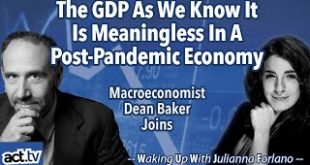Follow on Twitch: https://www.twitch.tv/actdottv Julianna welcomes back recurring guest Dean Baker, macroeconomist and co-founder of the Center for Economic and Policy Research, to discuss how when we talk about a post-pandemic economy, it’s important to know what we’re measuring. Too often, the raw numbers don’t take into account the important ways we evaluate well-being. Dean talks about how to look at the health of the economy beyond what contributes to the GDP and...
Read More »Global inequality in a time of pandemic
from Jayati Ghosh and issue 93 of RWER A global pandemic is a particularly bad time to be reminded of existing inequalities. But there is no doubt that the Covid-19 pandemic has highlighted the extent of inequalities between and within countries. Whatever may be the fond sentiments expressed by at least some global leaders, we are clearly not “all in this together”. It is true that in principle, a virus is no respecter of class or other socio-economic distinctions: it enters human hosts...
Read More »The World Economic Forum is planning the “Great Reset” to prevent it from happening
from Norbert Häring According to its own description, the World Economic Forum is “THE international organisation for public-private cooperation” and has as its main objective “to improve the state of the world”. The foundation, founded in 1971 by German economist Klaus Schwab, lacks neither power nor self-confidence. For years now, almost all the world’s major heads of government have made the pilgrimage to the annual meeting in Davos to pay their respects to multinational corporations...
Read More »Damn facts
from Peter Radford It seems appropriate to mention increasing returns today. After all, this is the day on which several of our modern titans of industry are appearing before Congress to respond to the concerns raised by the gargantuan size that their respective businesses have grown to become. The CEOs of Apple, Amazon, Google, and Facebook are all under the gun to defend the enormous clout that each wields in the modern marketplace. Today is the culmination of a long investigation by...
Read More »USA record 32.9 percent drop in GDP
from Dean Baker The saving rate hit a record 25.7 percent level in the first quarter, indicating that few of the pandemic checks were spent The Gross Domestic Product (GDP) shrank at a record 32.9 percent annual rate in the second quarter. While almost all the major categories of GDP fell sharply, a 43.5 percent drop in consumption of services was the largest factor, accounting for 22.9 percentage points of the drop in the quarter. Nonresidential fixed investment also fell sharply,...
Read More »Zombie capitalism
from David Ruccio Capitalism’s crises are clearly becoming deeper and more severe. After the crash of 2007-08, the United States (and much of the rest of the world) was subjected to the Second Great Depression, the worst economic downturn since the depression of the 1930s. Now, in the midst of the novel coronavirus pandemic, business activity has ground to a halt and unemployment has soared to levels reminiscent of the first Great Depression. Not surprisingly, both Main Street and Wall...
Read More »Why economics is an impossible science
from Lars Syll In a word, Economics is an Impossible Science because by its own definition the determining conditions of the economy are not economic: they are “exogenous.” Supposedly a science of things, it is by definition without substance, being rather a mode of behavior: the application of scarce means to alternative ends so as to achieve the greatest possible satisfaction—neither means, ends, nor satisfaction substantially specified. Exogenous, however, is the culture, all those...
Read More »Thoughts on Zachary Carter’s The Price of Peace
from Dean Baker I just finished reading Carter’s book and I will agree with the general assessment. It is an outstanding book that brings together much useful material on the life and influence of Keynes. While I am of course familiar with Keynes’ history and the history of Keynesianism, there is much that I learned here. In particular, I am impressed with the importance he gives Joan Robinson in spreading the ideas of Keynes, especially to followers from the United States. When I first...
Read More »Radical uncertainty
from Lars Syll In Radical Uncertainty, John Kay and Mervyn King, two well-known British economists, state that rather than trying to understand the ever-changing, uncertain and ambiguous environment by trying to understand “what’s going on here”, the economics profession has become dominated by an approach to uncertainty that requires a comprehensive list of possible outcomes with well-defined numerical probabilities attached to them. Drawing widely on philosophy, anthropology,...
Read More »MMT = Keynes 2.0
from Lars Syll As time goes on, and 2020 turns into 2021, the long-held idea that governments are like households and businesses that have to repay their debts, or even that government deficits must be financed by debt at all, will increasingly be exposed as a mistake. It will be more or less a return to Keynes, except with the twist that the Keynesian aim of balancing the budget over the course of the cycle – deficits in bad times, surpluses in good times – doesn’t matter, not that...
Read More » Real-World Economics Review
Real-World Economics Review






